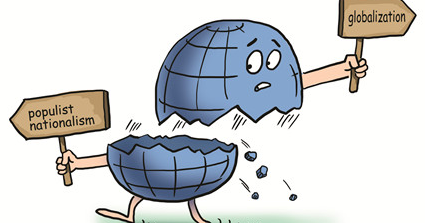A Global Paradox: “The Great Muddling Through” Continues
When one era ends and another begins is always a hot topic for historians and academics, because history does not make it easy. The old staggers on for a long time, despite it having become pointless or exhausted. The new is not always ready to take center stage, so it is never clear as to when it started. It is Sorites Paradox. Just as we know there is a point where grains of sand eventually become a heap, we know one epoch gives way to another, but exactly when is impossible to say.
Of course, while you are in such a transition period, it is even more difficult to know when the old has finally receded into the past and when the new has begun. History is full of false starts and false transitions. Ideologues are always sure the great transition is right around the corner. For the people living through a transition, it just feels like a “great muddling through” for those aware of what’s happening. For the rest it is just the way things are, as they try to not to think about such things.
Whether we are in such a great transition is hard to know for certain, but people who think of such things are thinking about it. This paper on how NATO can adapt to the populist era is such an example. It is written by Jeff Giesea, someone who has been on the edges of populist politics in America. The focus on the paper in how NATO can adapt to the rise of populism in Europe in order to maintain itself and address some of the issues that give rise to populist movements.
NATO is a great example of why marking the end of one period and the start of the next is so difficult, especially for the people living through it. The senior administrative staff in NATO probably started their careers in the Cold War. Many of the senior political leaders in the West are still people who came of age in that era. NATO has already outlived the Cold War and now may be outliving the age of globalism. It is a legacy institution that still staggers on for no obvious reason.
That’s why they invest time and money thinking about how the institution can adapt to the new age, whatever one calls it. What started as a temporary alliance among Western nations to guard against Soviet aggression in Europe, is now a permanent part of the European landscape. It’s like a union job or a government contract. No one wants to see it end. The Red Army is long gone, but NATO remains ready for them if they ever reappear on the European Plain.
It is a good example of the problems of post-nationalism. NATO was always a national entity, designed to defend nations. In a world without borders, having a military organization built for defending borders makes little sense. Critics of the organization always point to the collapse of the Soviet Union, but the bigger problem for NATO is that it is rooted in the concept of sovereign nations. Each member contributes men, material, bases and money to maintain a joint military force.
In a world where European countries don’t have control of control over their own budgets and cannot mint their own coins, how can they possibly have an active voice in a military alliance? Italy, for example, has to get permission from Brussels to operate a new landfill or power plant. The EU regulates the acceptable size of bananas and how much can be spent on picking up dog droppings. Globalism reduced nations to dependents with no agency of their own.
NATO also underscores a hidden truth about globalism and that is it only exists because the American empire exists. NATO exist because America keeps it going. If America ever started acting like a real country again, it would abandon legacy entities like NATO, as they serve no national interest. The same is true about globalism. The EU has been allowed to flourish, because it enjoys American protection. Take that protection away and Europe returns to a continent of nations.
It’s also an example of how the people muddling through a transition period may be all wrong about what they are noticing. The conventional wisdom says the world is transitioning from nationalism to post-nationalism. Global entities will supplant nation states and global corporations will manage the global economy. These populist uprisings we see in the West are just rearguard actions by those who will not be part of the glorious multicultural global paradise that is tomorrow.
In reality, we may be living through the opposite. The Cold War era may have been the globalist era, dominated by two great democratic empires. On the one side was the democracy of communism. On the other was the democracy of natural rights. First the Soviet Empire collapsed and now the American Empire is receding. The flurry of cosmopolitan globalism is not a rearguard action, but more like the scavengers profiting from the end of that great epoch in Western history.
What is called populism today is simply the West waking up from the long slumber that was the great battle between two empires. Generations of Europeans sublimating national interests for a common defense are now waking up from that period to assert those interests again. In the US, regional and now racial interests that have long been suppressed are bubbling up to the surface. Just as NATO is an entity from a bygone era, cosmopolitan globalism is the echo of a bygone age.
Tyler Durden
Wed, 02/12/2020 – 21:45
via ZeroHedge News https://ift.tt/39ux4Z1 Tyler Durden
